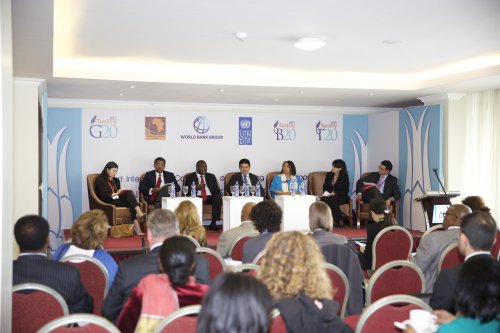Inclusive Business at International Development Financing Conference On the margins of the Third International Conference on Financing for Development, TEPAV, as the chair of Think 20 Turkey, co-organized two side events that convened business leaders, senior representatives of multilateral organizations and other high-level participants.

Addis Ababa, Ethiopia, 14 July 2015 - The Addis Ababa conference has been a major step in the lead-up to the upcoming United Nations Summit in September, where world leaders will adopt the Sustainable Development Goals (SDGs).
On June 13rd, along with the G20, Civil 20 and Network of Southern Think Tanks (NeST), Think 20 organized an event to discuss the development priorities of the G20. The event was opened with speeches by Deputy Prime Minister Ali Babacan and G20 Sherpa Ambassador Ayse Sinirlioglu, and included a panel discussion afterwards. Amar Bhattacharya, Senior Fellow at Brookings Institution, and Ussal Sahbaz, Director of G20 Studies Center at TEPAV, were the speakers representing Think 20.
Amar Bhattacharya, in his speech based on his new paper, emphasized that closing the infrastructure deficit will require 6 trillion USD global investment per year and the type of these investments will mostly determine whether the world will take a low-carbon or high-carbon growth trajectory in the upcoming years. Bhattacharya explained how the G20 can contribute this agenda through their own actions and investment strategies and by supporting global collective actions such as the development of norms for sustainable procurement and unlocking both public and private pools of finance.
Ussal Sahbaz, based on his paper, discussed the problems of G20’s relationship with LIDCs, pointing our two major issues: First, Africa is underrepresented in the G20 . Two, the G20’s development agenda – in the G20 Sherpa track - lacks focus and, and even more significantly, is delinked from the G20 finance track.. Sahbaz suggested bringing coherence to the G20 agenda by explicitly linking the core G20 agenda items such as infrastructure and trade to the development agenda, and by integrating of LIDC bureaucracies into the G20 development working group process.
On June 14th, Think-20 organized a high-level event on Inclusive Business as Contributor to the SDGs Implementation. The event was co-organized with the G20, Coalition for Dialogue on Africa (CoDA), the World Bank Group, the United Nations Development Programme (UNDP), and the Business-20.
The event included remarks by State Minister from the Ethiopian Ministry of Foreign Affairs Dewano Kedir; G20 Sherpa Ambassador Ayse Sinirlioglu, Director of the Foreign Aid Department of China Cai Fang; Head of Division on Financing for Development in Germany’s Federal Ministry for Economic Cooperation and Development, Stephan Ohme; former Italian Minister for Education, and now Co-Founder of San Patrignano Foundation, Letizia Moratti; and Director of the McKinsey and Company, Jeremy Oppenheim.
The event concluded with an interactive panel discussion, at which Ussal Sahbaz, Director for G20 Studies of TEPAV was a speaker. Ussal Sahbaz emphasized the importance of the role of G20 in developing inclusive business going beyond “experience sharing” and suggested that the G20 use its existing platforms, such as the recently established World SME Forum, to help integrate small entrepreneurs into global value chains.














